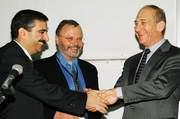Israeli - Jordanian Economic Conference - Foundation Office Israel
Seminar
Details
REPORT
The second KAS - IJCC meeting:
Regional Trade Relations and Cooperation with the E.U. &
the U.S.
The Konrad Adenauer Foundation Jerusalem, in cooperation with the Israel Jordan Chamber of Commerce, organized for the second time an economic conference on the QIZ (Qualifying Industrial Zones), which took place at Hussein Bridge, on the Israel -Jordan border, on October 21, 2003.
A tent was set up at this neutral place to welcome the guests of honor and the approximately 320 participants from altogether 16 different nations. The neutral place was chosen in order to avoid the necessity of an Israeli stamp in the passports of the participants from the neighboring states (some of which do not hold diplomatic relations with Israel).
The participation of the first Deputy Prime Minister of Israel - who also is the Minister for Economy and Trade - Ehud Olmert and of the Jordanian Minister for Economy Dr. Mohammad Abu-Hammour was seen as a sensation. Beforehand the organizers had arranged for both ministers - who met for the first time – to hold discussions in a small circle for an hour and a half. After all, the Jordanian minister was the first member of the Jordanian government to set foot on Israeli territory in three years. The relevance of this event was underlined by the participation of the American ambassadors in Tel Aviv and Amman, the EU ambassador in Israel as well as ambassadors from circa 10 other countries in the Middle East and Europe.
In March 1998 Jordan and Israel signed one of their most important economic treaties: the agreement on Qualified Industrial Zones (QIZ). In this document the industrial zone El Hassan Industrial Park was declared the first custom-free export zone with the United States of America. Due to its great success the US has meanwhile declared 9 other Industrial Parks QIZs. Under certain prerequisites, foreign investors can produce their goods in Jordan and bring them from the respective QIZ tax free and quota free, to the American market. Since July 2003 there have been ongoing negotiations between Jordan, Israel and the EU to reach similar export agreements within the Euro-Med.
Both organizers, Mr. Gerster and Mr. Gaon, emphasized the responsibility of the governments to improve the situation of their respective population through economic development. After the devastating World War II, the development of the EU started first with economic agreements between former enemies. Business co-operations between countries of the Middle East are a key to peace.
Dr. Mohammed Abu-Hammour, the Jordanian Minister for Industry and Trade, also emphasized the importance of the QIZ treaty for developing countries. It improves the social development - especially for women - and the quality of life. For minister Olmert, the good economic relationship between Israel and Jordan is proof of a solid and continuous relationship in spite of both partners’ well-known differences and sensibilities.
According to the American Ambassador in Israel, Daniel Kurtzer, this agreement was initiated because the American government believed that improved economic and business ties would promote trust, stability and security. The cooperation between Israeli and Jordanian companies would bring about a strong interaction, which again would lead to mutual understanding and more trust. The number of participants attending the second meeting would not only prove a constant and impressive rise in the Israeli-Jordanian trade but also an impressive increase in personal contacts between Israelis and Jordanians.
Mr. Gnehm, the American Ambassador in Amman, reported on a meeting with King Abdullah in Washington during which the king was asked about a possible break in the Israeli Jordanian relationship. He answered and repeated several times that the relations between both countries were of strategic importance for him and for Jordan. His father, King Hussein, had fought all his life to reach such an agreement with Israel. It is an obligation of the king and the Jordanian government.
EU ambassador Chevallard considers the Middle East region a natural expansion of the Euro-Mediterranean area and believes that the EU could play here a similar role to the one the USA played when supporting the European integration with the Marshall Plan.
The goal of the conference was to improve the transfer of goods between Israel and Jordan to the benefit of both. In the first session the speakers discussed the logistic agreements at the border crossings. During the past years the transfer of goods between Jordan and Israel has steadily increased and the cargo terminal at the Haifa seaport has been enlarged. By simplifying the procedures, reforming the tax system - especially in Jordan - and modernizing the customs' procedure, both governments are looking for ways of solving the bottlenecks and delays when clearing the goods at the border between Jordan and Israel as well as speeding up and reducing the costs of transportation through Israel.
In the second part of the conference Mr. Michele Villani, head of the economic division at the EU Embassy, spoke about extending the QIZ agreement between the US, Israel and Jordan to the European market. The EU supports the regional integration into the Mediterranean area. Within the MEDA program, measures for financial and technical support of the European - Mediterranean free trade area play a central role. A special working group managed by the European commissioner for trade, Pascal Lamy, has been discussing the modalities of integrating Jordan into the Barcelona process.
For Amer Hadidi from the Jordanian Ministry for Trade, this integration is an important perspective for Jordan. The QIZ agreement will bring peace and prosperity to this region. Positive outcomes of the QIZ agreement with Israel and the US, can already be felt today in Jordan’s rural areas.
Gabi Bar, head of the Israeli QIZ committee and member of the special working group, hopes to pass on the working group’s recommendations to the European Trade Commission before the end of this year. Even though the negotiations with the EU are much more complicated than with the US such an agreement will bring both countries closer together since Jordan and Israel complete each other in this field instead of competing with each other.
Through the final session it was once more emphasized that even though the QIZ project mainly focuses on supporting the economy, such conferences also promote the dialogue between two formerly hostile states. Many talks on the fringe of the conference confirmed that the contacts will be kept up and the dialog continued.
Catherine Hirschwitz




